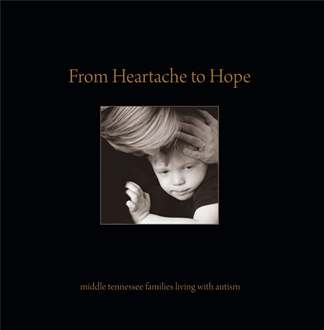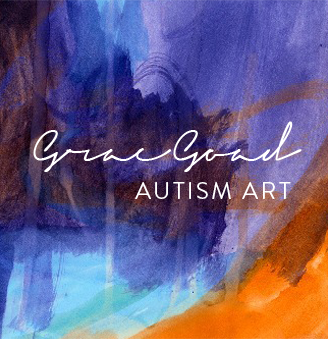Gayle Lee, my friend and a mentor-from-a-distance, was always blazing trails of creativity, accesibility and spirituality for her own daughter with autism. Grace and I would pursue a unique or seldom pursued (in the autism/disAbility community) activity or lead and would learn that Gayle and her daughter, Lyrica Marquez, had already been there, done that. Now here's their story and news of their book premiering here in Nashville. Read on. It's a very different take on autism:
Copyrighted: "Angel Seen in Autism" by Lyrica Marquez. In addition to being a "spiritual savant," and a movingly deep poetic writer, Marquez is also a visual artist. Art is one trail that perhaps we blazed before Lyrica and her mother. It is my understanding that Lyrica only began pursuing visual art in recent years. In her last years in Nashville, before moving West with her mother, she created her works at Art & Soul Studio with artist Karen Carter. More about Lyrica's heart-piercing art on the book's website, http://www.awetizm.com
—————————————————————————————
"For years, scientists have tried to unlock the mystery of autism. Now former Nashville resident, Gayle B. Lee and her autistic daughter Lyrica Mia Marquez, offer new hope to autistic people, their parents and the world in their new book, AWEtizm: A Hidden Key to Our Spiritual Significance. The book is published by Chrysalis Gold, LLC and distributed by Atlas Books.
"Lyrica was born without the ability to move or communicate with the outside world. A quick recommendation of institutionalization was followed by a diagnosis of autism. Gayle refused to give up on her daughter. At the age of eight, using a supported typing process Lyrica wrote, “I am not retarded, I am intelligent.” Suddenly, new doors opened for Gayle, allowing her to see inside her daughter’s autistic world.
"Mother and daughter’s journey into this new realm was reported in The Tennessean on November 16, 1992 with two articles chronicling the educational history made by the two. The story outlines how that instant of Gayle’s discovery of Lyrica’s ability to use facilitated typing marked the turning point not only for this family but for countless others.
“At that moment in 1984, Marquez discovered a new method of sharing thoughts for people with disabilities. The method is called facilitated communication. It works by allowing an able person to help a person with disabilities to spell out words on a keyboard,” The Tennessean stated. “Two years later the method was announced by experts in Australia and the news began a slow journey into the United States.” It was accepted nationally, including Tennessee, and in 1992 Lyrica entered Nashville’s Hillsboro High School as a special education student attending regular classes with a facilitator.
"The Tennessean noted Marquez was one of two parents to unlock their childrens’ prison of silence before the method was named – the other was 1981 Nobel Prize winner in physics, Arthur Schaallow of California.
"Mother and daughter will be in Nashville to celebrate the [Indie-award-winning] book’s release, where their journey began. All are invited to join them in the celebration at the Green Hills Hampton Inn and Suites at 2324 Crestmoor Drive on Sunday, June 5 from 2 pm – 4 pm, with opening remarks at 2 pm.
"To learn more about the book for purchase and view the incredible video, visit www.awetizm.com. Follow it on Twitter, Facebook and check out YouTube at www.youtube.com/user/gayleblee."





excellent!
So cute! I already like you on FB and also get your posts on Google Reader. 🙂
No offense, but i suggest adding a facebook like button for the blog!
Ella, you are so right. I know. I know. It’s on a four-year-old to-do list. I am making plans to take care of this. I put it up a year ago and it’s tricky to get it placed right on this platform and then when I did I freaked that i had three years of “unliked” posts as a result and took it down. I’ve been assured to not let that deter me.
Thanks, Margie! You’re welcome.
Thanks for your kind words! The best way to find out if you have an ASD is to go to a psychiatrist or other thpareist, but I wouldn’t recommend doing that unless you are having trouble coping with symptoms, or if it is interfering with your ability to live a regular lifestyle. If you’re starting to have trouble at work or something like that, that would be a reason to see a doctor. If you are not having trouble, though, the best way to know whether you would fall into the autistic spectrum is to do research. Major symptoms besides social impairment and odd fixations include hypersensitivity, especially to loud noises, and, in the case of mild autism, language delays. If you never had language delays, you probably do not have autism, but Asperger’s Syndrome could be an option.I learned all my instruments because of my obsession with musical instruments. Most kids liked to play with dolls and things like that, but I liked to play music. I am also able to learn instruments very fast because I have synesthesia, which lets me see notes and instruments as colors and shapes. I hope that helped!
Thank you so very much for your kind words! I used to be a care assistant to the erledly with dementia, and it hit me extremely hard when my epilepsy meant that I had to give up the job I adored (I wanted to follow in my Nan’s footsteps and become a nurse) so I understand your frustrations in terms of employment opportunities (or lack of).When I look at my life now I realise that I still have so much more than a lot of people. I have wonderful friends, a family who love me, a secure roof over my head, no money worries and a loving partner. I have a garden where I can plant my favourite flowers and watch the birds, and my partner grows vegetables and tomatoes. I also find other ways to care about people sending out food parcels to friends or cross-stitching something just because . I’ve learned that you don’t have to be able-bodied, fit and active in order to make a difference.That boy of mine is indeed a hunk and he knows it, haha!